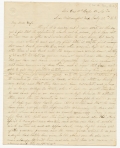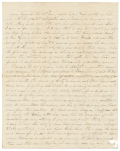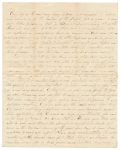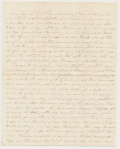site search
online catalog
CONFEDERATE LETTER/ GETTYSBURG CAMPAIGN — PRIVATE CHARLES M. FIGGATT, CO. “C”, 1ST VIRGINIA CAVALRY
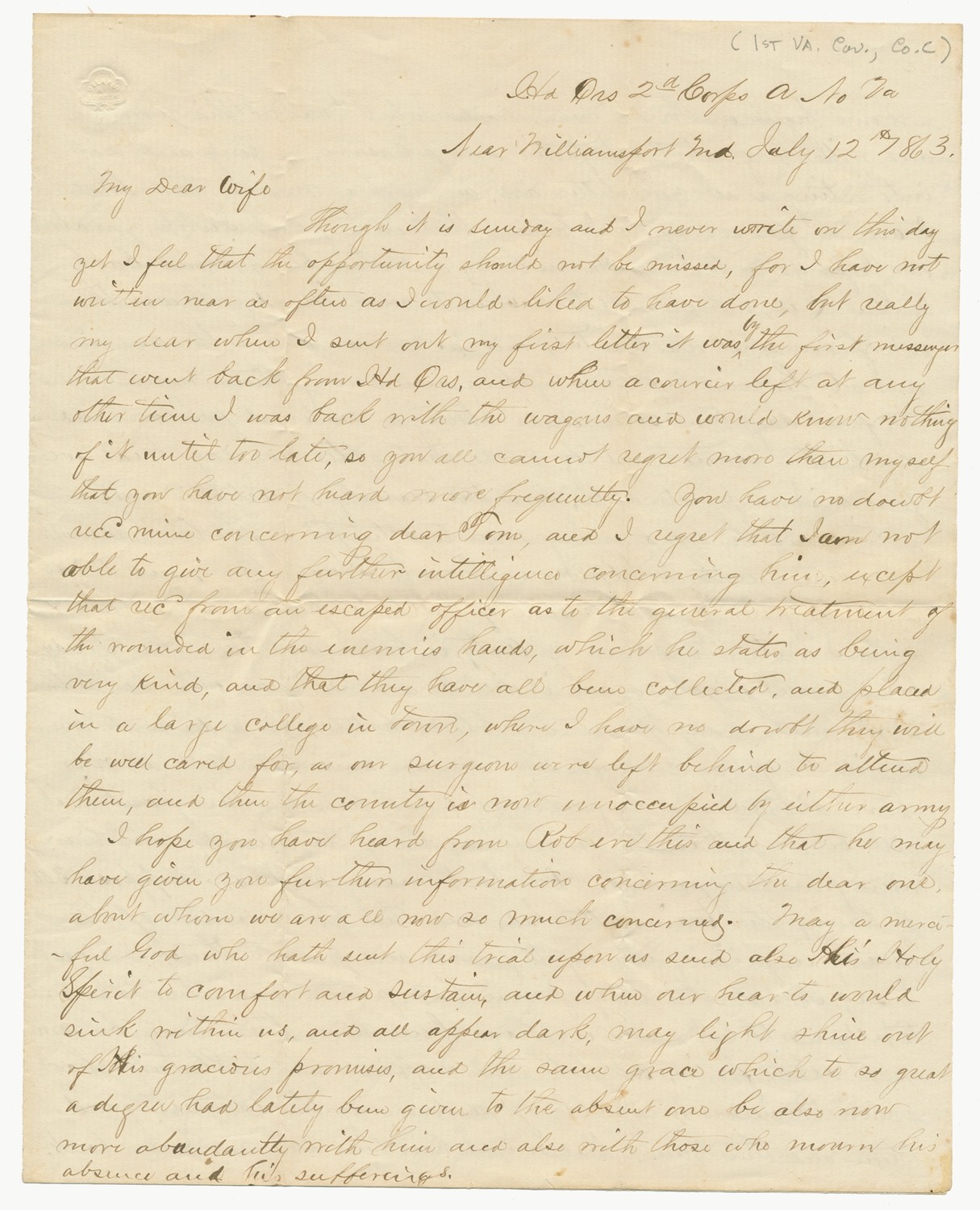
$2,950.00 SOLD
Quantity Available: None
Item Code: 224-317
Dated “Hd Qrs 2nd Corps A No. VA/ Near Williamsport Md July 12th 1863.” 4 pp., in ink, on unlined paper, 8 x 10”, watermark — “Delarue/London.” Exhibits fold-lines and slight yellowing. Else VG plus, and entirely legible.
Charles Miles Figgat was a 26 year old bank clerk from Lexington, VA, who mustered as a private in Co. “C”, 1st VA Cavalry, 9/20/1862. He was Immediately detailed as a clerk to Gen. Jackson’s, and later, to General Early’s Headquarters, serving through August 1864, NFR. The following letter to his wife was written from Williamsport, MD, during Lee’s retreat from Gettysburg. It contains a headquarter clerk’s remarkably astute summary of Confederate losses at Gettysburg; followed by spiritual exhortation to boost his wife’s spirits during a dark, dark time. Ann “Nannie” Godwin Figgatt had lost a younger sister, Jenny, in the spring, and was nursing a sickly infant, Charles Mead Figgatt, destined die in autumn. At Gettysburg her brother Tom had been captured and would lose lost an arm .
Text:
“My Dear Wife…Though it is Sunday and I never write on this day yet I feel that the opportunity should not be missed, for I have not written near as often as I would liked to have done, but really my dear when I sent out my first letter it was by the first messenger that went back from Hd. Qrs. And when a courier left at any other time I was back with the wagons and would know nothing of it until too late, so you all cannot regret more than myself that you have not heard more frequently. You have no doubt rec’d mine concerning dear Tom, and I regret that I am not able to give any further intelligence concerning him, except that rec’d from an escaped officer as to the general treatment of the wounded in the enemies hands, which he states as being very kind, and that they have all been collected, and placed in a large college in town [Gettysburg College], where I have doubt they will be well cared for , as our surgeons were left behind to attend them, and there the country is now unoccupied by either army.
I hope you have heard from Rob ere this and that he may have given you further information concerning the dear one, about whom we are all now so much concerned. May a merciful God who hath sent this trial upon us send also the Holy Spirit to comfort us, and all appear dark, may light shine out of His gracious promises. And the same grace which to so great a degree had lately been given to the absent one be also now more abundantly with him and also with those who mourn his absence and his sufferings.
Yours begun on the 28th June;, mailed July 6th was rec’d this morning and with the greatest satisfaction and pleasure, as long and so interesting as all your letters are, and appear more so now that I am so faraway. I believe that in my last I wrote you about our Corps going to near Harrisburg, and then ordered back by Gen. Lee, which was to have us to meet Mead, who was then out of VA, what was wanted, and as you are aware the armies met at G, and after whipping and driving them many miles the first day, they secured so strong a natural position and which they strengthened by works, that after two days trial we found it impracticable, from the scarcity of artillery ammunition, and the loss of many men to attempt a further assault and consequently withdrew our forces to Hagerstown, and to day as well as yesterday are in line of battle expecting an attack & while I write, the sound of Arty. Is heard, and there has already been some fighting, and it will be a wonder if another Sabbath is not made a day of a terribly bloody battle, for a desperate one it will be if they come for our men are anxious to have another chance at them, and being entrenched and having a firm position it will be more than the enemy ever did if they dislodge our brave men their position. We lost many wagons. I suppose 300 by having the trains attacked, and then the cowardice of the cavalry in failing to utterly to guard and protect them, I regret to say it but this body of men have proven themselves almost totally worthless since we have been here, there may be some good reason for it, but both men & officers up to Steward have shown themselves incapable of performing the duty assigned them, and thus much that might have been has been lost.
Our loss at G. was very heavy indeed, not unusual in killed and wounded, for the nature of the fight, but a great many were taken prisoners, lost in killed, wounded and missing 12 or 13 Generals, and from 15 to 20,000 others, some 6 or 7,000 prisoners, but we captured as many as we lost in our Corps some 700 or 800 killed and 3,000 wounded. The loos in the other Corps was greater in prisoners than our own, except Picket’s Div., which as I wrote you before was broken up entirely, having more than half of their number, many being prisoner. I hope the absent ones will be at home soon.
Tell Mrs. M that her son being in an other Corps, and we not near together have not been able to hear any thing of him. I wish it was so that you could come and pay me a visit, but I can assure you, that you would be glad to get away, and never come again, for it is hard enough for any one to stay here, and if I ever thought I wanted peace and was mistaken until now, for the faling is now so great that the other was only a first idea of what was desired. O that the people would pray to God for His blessing and for the blessing of peace especially a peace that shall redound to his honor and glory and give happiness to our disrupted country. O when will all this cease and how long Oh Lord! How long shall we mourn and languish under their afflicting rod, O send us help from trouble, for vain is the help of Man. We know that in his own good time all will be well, and though the struggle is sometimes hard yet even in the darkest hours of the past few days I have been enabled to cast all upon Him and committing the whole country into His hands, have felt that, though we should be crushed it will be by Gods power and in His vision and beyond this we need not look for we are assured as it is for his glory, and for our good if we love Him. I regret much my dear to hear of your state of mind, and the feeling which you express with regard to your right to an inheritance with the just, which tile is along thro’ the blood of Jesus not by any6 thing that we have done, ar can do, but purchase for freely, and give to us with price, and which one can take from us, if we hold fast the promises frim unto the end, and I pray that my dear wife may ere this have had these dark clouds removed from here heart and that through faith she has been enabled to lay hold upon the blessed promises of the bible, and that faith to cast herself upon the army of him who has it always extended, that for fear that some of the little ones might fall. He can support and hold them up. O that you may ever be able to find the true source of comfort, and delighting greatly in Hs Commandments, may been enabled to serve God acceptably unto the end and find at last a reward for your labors in receiving bliss. How much do I think of you in connection with our dear little ones, and how much I feel for you, along & striving to train them aright, and would that I could aid you! But this cannot be, and I pray God that wisdom and strength may be given you, at all time, to do that which is right, and that we both so much desire should the way in which they should be raised, that from their youth, dedicated to God in infancy they may so grown up, that God may in them and that they may be wholly his.
This above all things else I know to be the heart felt desire of their dear mother as well as myself, and may God grant us the desire of our hearts.”
At the war’s end, Charles Miles Figgatt returned home to become a trusted cashier of the Bank of Lexington. Unfortunately, thirty years later, in Feb. 1895, he absconded with $180,000 in bank funds, disgracing both himself and his wife’s family.
Fleeing undetected to Lockett, Colorado, Figgatt lived quietly under the assumed name of Charles Miles until his death in 1899, at age 63. Meanwhile, back in Lexington, following his disappearance, bank teller, Robert K. Godwin was convicted and sentenced to four years in prison, though later pardoned by Virginia Governor Tyler after serving 32 months. Bank teller Godwin was the brother of Cashier Figgatt’s wife, Ann Godwin Figgatt, and the letter that Cashier Figgatt left behind absolving him of complicity in Figgatt’s embezzlement failed to prevent his conviction.
After 120 years, the fate of the missing bank funds remains a mystery. Figgatt’s assets at death consisted of twenty eight dollars and a dime. At his death, Figgatt’s Virginia antecedents were discovered by Colorado authorities and his remains were returned to be buried in in the Slicer-Godwin Cemetery, Fincastle, VA. His wife, An, who lived to til 1919, was buried alongside him .
In all, a remarkable letter from the 1863 Gettysburg campaign, by a Virginian with an equally remarkable post-war scandal attached to his name. On both counts, this letter from Pvt. Charles Miles Figgatt to his “Nannie” makes for an excellent collectible. In protective sleeve, accompanied by “Dear Nannie: The Civil War Letters of Fincastle’s Charles Figgat and Ann Godwin”/ Roanoke [VA] Times, Dec. 10, 2011.
Includes a copy of his military records as well as internet research material. Additional research is certainly a possibility. [jp]
~~~~~~~~~~~~~~~~~~~~~~~~~~~~~~~~~~~
THIS ITEM, AS WITH ALL OTHER ITEMS AVAILABLE ON OUR WEB SITE,
MAY BE PURCHASED THROUGH OUR LAYAWAY PROGRAM.
FOR OUR POLICIES AND TERMS,
CLICK ON ‘CONTACT US’ AT THE TOP OF ANY PAGE ON THE SITE,
THEN ON ‘LAYAWAY POLICY’.
THANK YOU!
Inquire About CONFEDERATE LETTER/ GETTYSBURG CAMPAIGN — PRIVATE CHARLES M. FIGGATT, CO. “C”, 1ST VIRGINIA CAVALRY
For inquiries, please email us at [email protected]
Most Popular
Historical Firearms Stolen From The National Civil War Museum In Harrisburg, Pa »
Theft From Gravesite Of Gen. John Reynolds »
Cavalry Carbine Sling Swivel »
Fine Condition Brass Infantry Bugle Insignia »
featured item
THE ONLY KNOWN WIDMANN 1840 CAVALRY OFFICER’S SABER: DATED 1844
This is a unique opportunity to acquire a one-of-a-kind U.S. cavalry officer’s saber. Frederick W. Widmann emigrated to the U.S. in 1816 and set up business in Philadelphia as a die-sinker and sword-mounter using imported sword blades by 1825.… (870-279). Learn More »



